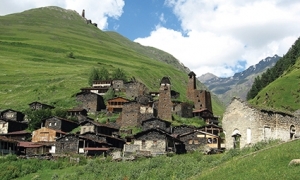Mountains Law: Political Decision or True Aim to Boost Entrepreneurship?
Businesses in the mountain regions of Georgia were released from taxes from January 1st, 2016. According to the Mountains Law, natural persons who start business in the mountain regions will be exempt from income tax for 10 years and legal entities will not pay property and income taxes for 10 years.
The Mountains Law also offers social benefits to pensioners, doctors, nurses and teachers who live in the mountains. In particular, pensioners who are permanent residents in the mountains will receive 216 GEL from September, 2016, while other pensioners will receive 180 GEL. Medical staff of the mountainous regions- nurses and doctors- will get supplemental pay. Teachers will receive at least an additional 35% of their basic salary.
The Mountains Law also includes benefits for child birth. The first and second child born after January 1st 2016, to at least one parent being a permanent resident of a mountainous region, will receive at least 100 GEL a month for a year; while the third and each subsequent child will receive at least 200 GEL monthly allowance for two years.
The Law also provides for the winter period (from October 15 to April 15 of the following year) to pay for electricity from the state budget for permanent residents of the mountainous regions.
The government has already approved the list of mountain settlements. 1,582 mountainous settlements were granted the status, including Khevi, Mtiuleti, Pankisi Gorge and Gudamakari Gorge, mountainous Adjara, Pshav-Khevsureti, Tusheti, Upper and Lower Svaneti, Racha and Lechkhumi.
The Mountains Law aims to develop businesses and encourage people to stay in mountainous regions.
“This Law aims to determine benefits to stimulate social and economic progress of the mountainous regions guaranteed by the Constitution, to ensure the welfare, raise living standards, support employment, and to improve social and economic conditions of the people living in mountainous regions,” state the objectives of the Law.
Some experts, however, see risks in the Mountains Law. One such risk is that there is a chance of corruption; any governor can help people or their relatives to register in the mountains and get the needed status.
“We don’t have an institution of registration,” said Vato Lejava, Free University Chancellor. “People can be registered wherever they want. If there are some benefits somewhere, no one would prevent it, for example, all the pensioners could register in Oni district (located in mountainous north western Georgia), so a part of the costs cannot be controlled. This Law will lead to a pseudo migration process,” he said.
According to Tengiz Shergelashvili, Deputy Minister of Regional Development, 60,000 GEL will be spent in 2016 and 100,000 GEL in 2017 under the Mountains Law. A number experts don’t expect these costs will have adequate effects. Economists believe that the government should take action to ensure a limited number of people receive the status of Mountains Law beneficiary in order to avoid increased costs. Under the law, people can register in the mountains, but then do nothing there. In this case, the state will have to take on additional control mechanisms.
“The work force is lower in mountainous regions, with a high elderly population,” Rati Kochlamazashvili, International School of Economics (ISET) researcher, told eugeorgia.info. “So this law may have a social purpose rather than business development. In general, someone will open a hotel, someone will build something, but the question is how corresponding the effect will be to State costs. Overall, this is a political decision made for the elections, rather than for the development of entrepreneurship.”
Mountains Law first was adopted in 1999 and ceased functioning in 2009. Making a new Mountains Law was the pre-election promise of coalition Georgian Dream, now the ruling party of the Georgian Government.
Ana Akhalaia











